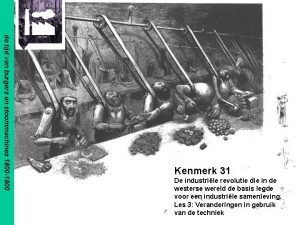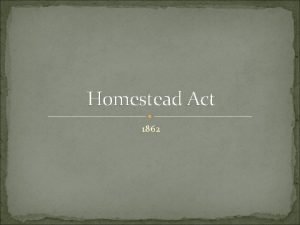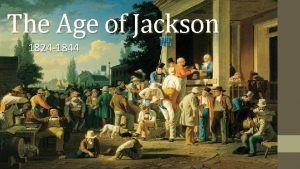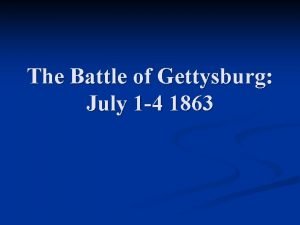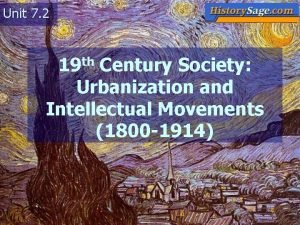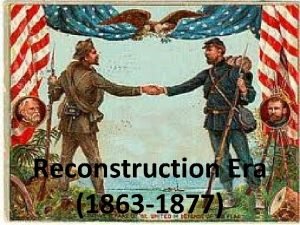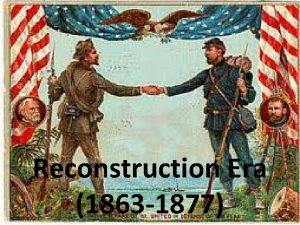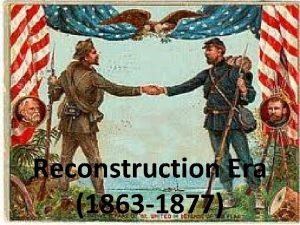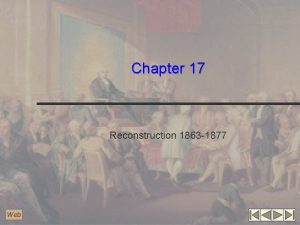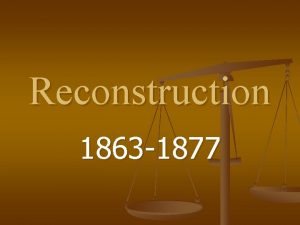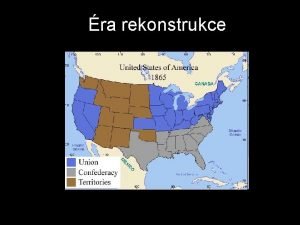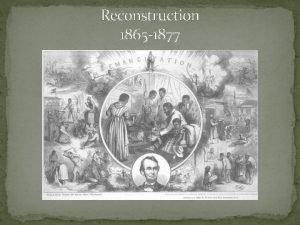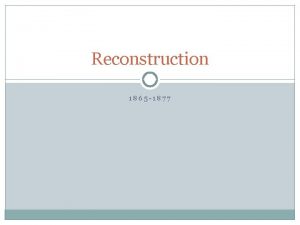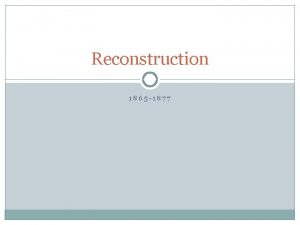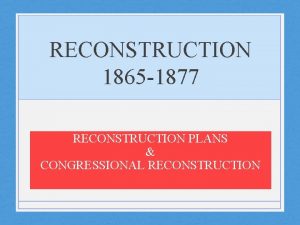Reconstruction 1863 1877 Period 5 1844 1877 Ch

















- Slides: 17

Reconstruction, 1863 -1877 Period 5 (1844 -1877) Ch. 15 AP U. S. History

Think About It ► To what extent did Reconstruction maintain continuity and foster change in American politics and society?

Reconstruction, Phase 1 Lincoln’s Plan ► Proclamation of Amnesty and Reconstruction (1863) § Full presidential pardons for 1. Oath of allegiance, ► 2. Accept end of slavery ► § Ten Percent Plan ► Confederate state reestablished once 10% of voters affirmed allegiance and loyalty Wade-Davis Bill (1864) ► Second Inaugural Address § “with malice toward none; with charity for all” ► Lincoln’s Assassination § April 14, 1865 ►

Freedmen’s Bureau ► Bureau of Refugees, Freedmen, and Abandoned Lands in March 1865 ► Food, shelter, medicine for freed blacks and displaced whites ► Education of blacks and colleges ► Viciously attacked and ridiculed by Northern racists and bitter Southerners

Andrew Johnson (D) (1865 -1869) ► Politics § War Democrat § Defender of Poor Whites ► Resented planter class § White supremacist ► Major Issues § Reconstruction § Impeachment

Reconstruction, Phase 2 Andrew Johnson’s Plan ► Reconstruction Plan § Very similar to Lincoln’s 10% Plan § No pardons for Confederate leaders and owned $20, 000 taxable property § Admitted Confederate states with appointed governors who established voting procedures for state legislatures § States must abolish slavery and secession clauses from state constitutions ► Effects § Johnson ended up pardoning many wealthy planters; constantly overriding his own plan. § Former confederates elected to office, including the U. S. Congress § All Confederate states came back to the Union relatively fast § Black codes enacted

The Radical Republicans ► Radicals § Thaddeus Stevens (House) § Charles Sumner (Senate) ► Republicans took control of Congress, didn’t allow newly elected Southerners into D. C. , passed new laws for state admittance ► Midterm Election of 1866 § “Not every Democrat was a rebel, but every rebel was a Democrat!” § Republicans won supermajorities in both houses of Congress Anti-Radical Republican propaganda Pennsylvania, 1866

Reconstruction, Phase 3 Radical Republican Plan ► ► ► Fourteenth Amendment (1868) § Anyone born or naturalized was American citizen (Citizenship Clause) § “nor shall any State deprive any person of life, liberty, or property, without due process of law” (Due Process Clause) § “nor deny to any person within its jurisdiction the equal protection of the laws” (Equal Protection Clause) § Disavowed Confederate leaders; cancelled war debts of ex-Confederate states; loss of electoral votes for disenfranchisement Reconstruction Acts of 1867 § Military districts § New state constitutions approved by Congress § Black suffrage guarantees § Ratification of the 14 th Amendment Fifteenth Amendment (1870) § Right to vote for blacks

Election of 1868 Ulysses S. Grant (R) ► Horatio Seymour (D) ►

Northern Influence on the South ► Scalawags § Southern Republicans fostering American Systemtype programs § Cooperated with Northern politics and economics ► Carpetbaggers § Northerners investing in “New South, ” § Reformers/provide aid § Squatters and plunderers

Freedmen in the South ► Political Recognition § Voting Rights § Affiliated with Republican Party § Public Office ► ► ► 2 U. S. Senators 14 U. S. Representatives 630 black state legislators Black governor of Louisiana Desire for Autonomy and Opportunity § Independent churches § Public schools ► Slavery By Another Name § Sharecropping

Sharecropping ► ► ► 50% white farmers and 75% black farmers Crop-lien system Tenant farming

Ulysses S. Grant (R) (1869 -1877) Civil War hero, but no political experience; linked with moderates and Radicals ► Greed and Corruption ► § Spoils System § Credit Mobilier Union Pacific Railroad creates dummy construction company to hire execs at inflated salaries and earn high dividends ► Sold stock to Republican congressmen and bribed press to keep quiet ► § Whiskey Ring ► Republicans embezzled liquor tax revenues using bribes and networks

White Southern Resistance ► White Supremacy Paramilitary Groups § The South Will Rise Again! § Ku Klux Klan (1867) ► ► Nathaniel Bedford Forrest Amnesty Act of 1872 § Allowed most southerners to vote again; re-established Democrat control of the South “The Union as it Was” Thomas Nast, Harper’s Weekly October 1874

Election of 1872

“Election” of 1876 Samuel Tilden (D) ► ► ► Rutherford B. Hayes (R) Republicans struggle to nominate “boring” Rutherford B. Hayes Democrats nominate solid and popular Samuel J. Tilden won the popular vote solidly and needed only 1 more electoral vote for majority Contested electoral votes in 3 Reconstruction states (Louisiana, South Carolina, Florida) Electoral Commission rewarded 3 sets of electoral votes to Hayes § Split ideologically 8 -7 in favor of Republicans

Compromise of 1877 ► Hayes will become president, if… § Remove federal troops from the South § Help develop infrastructure in South, ex. Railroads § Appoint Southerner to Cabinet § Limited enforcement of racial equality And that’s exactly what happened; Reconstruction formerly ends in 1877 with Hayes’ election. The North left the South alone and never looked back…until the 1960 s.
 Edouard manet olympia 1863
Edouard manet olympia 1863 Manet, olympia, 1863
Manet, olympia, 1863 Hjälper sedan 1863
Hjälper sedan 1863 1844 eerste telegraaflijn
1844 eerste telegraaflijn Homestead act of 1863
Homestead act of 1863 The age of jackson 1824-1844
The age of jackson 1824-1844 Jeff wall morning cleaning
Jeff wall morning cleaning Edouard manet olympia 1863
Edouard manet olympia 1863 What country did impressionism originated from
What country did impressionism originated from July 1-4 1863
July 1-4 1863 Nov 19 1863
Nov 19 1863 Edouard manet olympia 1863
Edouard manet olympia 1863 2nd industrial revolution timeline
2nd industrial revolution timeline Olympia, 1863
Olympia, 1863 1844 1910
1844 1910 The three uses of money
The three uses of money Prantsuse poeet 1844-1896
Prantsuse poeet 1844-1896 Anjo 1844
Anjo 1844



